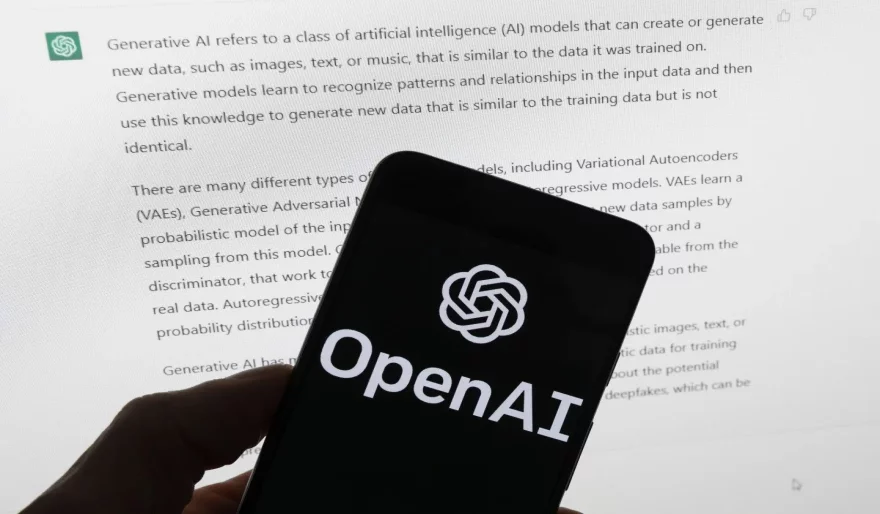OpenAI And ChatGPT: An FTC Probe And Its Implications For AI Development

Table of Contents
The FTC's Concerns Regarding OpenAI and ChatGPT
The FTC's investigation into OpenAI and ChatGPT centers on several key areas of concern, all related to potential violations of consumer protection laws. The allegations involve deceptive trade practices, data security vulnerabilities, and the potential for the spread of misinformation.
-
Allegations of Deceptive Trade Practices: The FTC's complaint likely focuses on whether OpenAI adequately disclosed the limitations of ChatGPT. A powerful generative AI, ChatGPT is not infallible; it can generate inaccurate, biased, or even harmful content. The question for the FTC is whether OpenAI adequately informed users about these inherent limitations, potentially leading to deceptive trade practices.
-
Data Security Concerns: The vast amounts of data used to train ChatGPT raise significant data security concerns. The FTC is likely investigating OpenAI's data collection practices, including the methods used to gather, store, and protect user data. Compliance with relevant data privacy regulations like GDPR and CCPA is a key element of this investigation. Breaches or inadequate security measures could expose sensitive user information, leading to significant legal repercussions.
-
Misinformation and Harmful Content: ChatGPT's ability to generate realistic-sounding text raises concerns about its potential for misuse in spreading misinformation and harmful content. The FTC is likely examining OpenAI's efforts (or lack thereof) to mitigate this risk. This includes exploring the development and implementation of safeguards to prevent the generation and dissemination of false or misleading information.
The potential legal ramifications for OpenAI are substantial, ranging from significant fines to operational restrictions. The outcome of this investigation will set a precedent for the regulation of other large language models and generative AI technologies. The FTC's actions underscore its commitment to ensuring the responsible development and deployment of AI, emphasizing the importance of consumer protection in this rapidly evolving technological landscape.
Implications for AI Development and Innovation
The FTC's investigation into OpenAI has significant implications for the future of AI development and innovation. Increased regulatory scrutiny can create a "chilling effect," potentially slowing down the pace of innovation. This effect could disproportionately impact smaller AI companies and startups, which may lack the resources to navigate complex regulations.
-
Responsible AI Development: The investigation highlights the urgent need for robust ethical frameworks and guidelines for AI development. Prioritizing AI safety and mitigating potential harms should be paramount, guiding the design and deployment of AI systems.
-
Increased Costs and Complexities: Navigating regulatory compliance adds significant costs and complexities to the AI development process. This includes investing in robust data security measures, developing transparency mechanisms, and implementing ethical review processes.
-
Balancing Innovation and Regulation: The challenge lies in striking a balance between fostering innovation and ensuring responsible AI development. Overly stringent regulations could stifle innovation, while insufficient regulation could lead to significant societal harms. Finding this equilibrium will be crucial for the future of AI.
Data Privacy and Security in the Age of Generative AI
Generative AI models like ChatGPT raise unique data privacy and security challenges. The sheer volume of data used to train these models, combined with their ability to generate human-like text, necessitates a robust approach to data protection.
-
User Consent and Transparency: Obtaining informed consent from users for data collection and usage is paramount. Algorithmic transparency, allowing users to understand how their data is being used, is equally crucial.
-
Compliance with Data Privacy Regulations: OpenAI, like all AI developers, must comply with existing data privacy regulations like GDPR and CCPA. This requires implementing stringent data protection measures and ensuring compliance with user rights related to data access, correction, and deletion.
-
Emerging Technologies for Enhanced Privacy: Technologies like differential privacy and federated learning can help to enhance data privacy while still enabling the training of powerful AI models. These methods offer a potential path towards responsible AI development that prioritizes user privacy.
The Future of AI Regulation and the Role of the FTC
The FTC's investigation into OpenAI and ChatGPT sets a significant precedent for future AI regulation. The debate continues regarding the most effective approach: government oversight versus industry self-regulation. A combination of both may prove most effective.
-
International Cooperation: The need for international cooperation in establishing global standards for AI ethics and safety is critical. AI doesn't respect national borders, requiring a unified approach to address its potential societal impacts.
-
The FTC's Role: The FTC will play a pivotal role in shaping the future of AI regulation in the US. Its actions in this investigation will influence future regulatory actions and potentially shape the development of new legislation specifically targeting AI.
-
Evolving Regulatory Landscape: The regulatory landscape for AI is rapidly evolving. As AI technologies continue to advance, the need for adaptable and comprehensive regulations will only increase. Staying informed about these developments is critical for all stakeholders.
Conclusion
The FTC's investigation into OpenAI and ChatGPT underscores the critical need for responsible AI development, placing ethical considerations at the forefront of technological advancements. The outcome of this probe will significantly influence data privacy practices, AI innovation, and the overall regulatory environment. Understanding the implications of this investigation is vital for navigating the evolving world of AI responsibly. Staying informed about the ongoing developments in the OpenAI and ChatGPT investigation, and the broader conversation surrounding AI regulation, is crucial for businesses, developers, and individuals alike. Continue to follow updates regarding OpenAI, ChatGPT, and the FTC investigation to stay informed about the future of AI.

Featured Posts
-
 County Durhams Premier Hairdressers The Northern Echos 2025 List
Apr 25, 2025
County Durhams Premier Hairdressers The Northern Echos 2025 List
Apr 25, 2025 -
 Bota De Oro 2024 25 Clasificacion Actual Y Aspirantes
Apr 25, 2025
Bota De Oro 2024 25 Clasificacion Actual Y Aspirantes
Apr 25, 2025 -
 The China Factor How It Affects Luxury Car Brands Like Bmw And Porsche
Apr 25, 2025
The China Factor How It Affects Luxury Car Brands Like Bmw And Porsche
Apr 25, 2025 -
 Sane Inspires Bayern Munich To Hard Fought Win Against St Pauli
Apr 25, 2025
Sane Inspires Bayern Munich To Hard Fought Win Against St Pauli
Apr 25, 2025 -
 Driving In Okc Stay Safe During Icy Conditions
Apr 25, 2025
Driving In Okc Stay Safe During Icy Conditions
Apr 25, 2025
Latest Posts
-
 Dong Duong Hotel Joins Fusion Hotel Collection In Hue
Apr 26, 2025
Dong Duong Hotel Joins Fusion Hotel Collection In Hue
Apr 26, 2025 -
 Saint Laurents Milan Design Week 2025 Tribute To Charlotte Perriand
Apr 26, 2025
Saint Laurents Milan Design Week 2025 Tribute To Charlotte Perriand
Apr 26, 2025 -
 Pierre Terrasson Exposition Photographique A La Galerie Le Labo Du 8
Apr 26, 2025
Pierre Terrasson Exposition Photographique A La Galerie Le Labo Du 8
Apr 26, 2025 -
 Fusion Portfolio Welcomes Dong Duong Hotel Hue
Apr 26, 2025
Fusion Portfolio Welcomes Dong Duong Hotel Hue
Apr 26, 2025 -
 Exposition Photographique Galerie Le Labo Du 8 Pierre Terrasson
Apr 26, 2025
Exposition Photographique Galerie Le Labo Du 8 Pierre Terrasson
Apr 26, 2025
